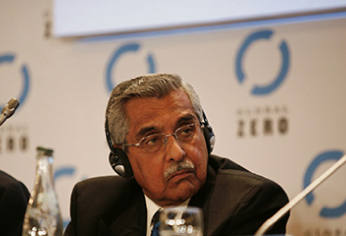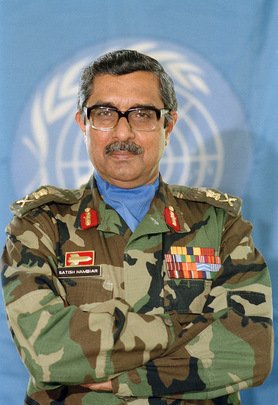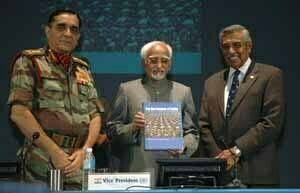
General Nambiar was born in Bombay (now Mumbai) on 30 August 1936, to Kunhianandan Nambiar and Chenicheri Devikutty. He did most of his education in Pune and Mumbai. He is an Alumnus of St Xavier’s College, Mumbai during which he was an Under Officer with the National Cadet Corps. While doing his graduation he joined the 20th regular course of the Indian Military Academy.
Commissioned into the 20th Battalion of the Maratha Light Infantry in December 1957, he saw active service in the country’s North-Western and North-Eastern theatres, including counter-insurgency operations, and the 1965 and 1971 conflicts on the sub-continent. He commanded two battalions of the Regiment: the 1st (Jangi Paltan) from April 1972 to November 1973, and the 20th (Mechanised) from November 1973 to July 1975. A graduate of the Australian Staff College in 1968, he later was a member of an Indian Army Training team in Iraq from July 1977 to January 1979, and on the faculty of the Defence Services Staff College at Wellington in the Nilgiris from April 1980 to January 1982. He attended the Higher Command Course at the College of Combat (now re-designated Army War College) in 1979-80. He raised and commanded the first mechanised brigade group of the Indian Army, and later commanded the Mechanised Division. He served as Military Adviser at the High Commission of India in London from December 1983 to November 1987.
The General served on the General Staff Branch at Divisional Headquarters, and in the appointments of Additional Director General and Director General of Military Operations at Army Headquarters. In the latter capacity, he led two defence delegations for discussions with Pakistani counterparts: in the meetings held in April 1991 at New Delhi, he negotiated an agreement (which still holds) on exchange of information between the two countries on conduct of military exercises and aircraft flights in the proximity of the border, as also communications between naval vessels at sea; and in September 1991 at Islamabad, he negotiated an end to hostile action between the two countries on the Line of Control in the Poonch Sector.

He is one of the few Indian generals to achieve international recognition as the first Force Commander and Head of Mission of UNPROFOR, the United Nations Protection Force in the former Yugoslavia, between March 1992 and March 1993. He was interviewed by the inquisitorial Tim Sebastian on BBC Hard Talk in later years for his views on the same. Gen Nambiar’s view is that there is nothing wrong with the UN organisation – it is the political will of the countries in the Security Council that needs to change. As he puts it, while the developed world may be dismissive of an ineffective UN it still remains the hope of much of the developing world. Gen Nambiar stresses on the point that the Indian Armed Forces are professional, principled and believe in working within the mandate provided by the institutional leadership – be it the UN Security Council or the Indian Government.
Declining an offer of extension, he returned to the rolls of the Indian Army, and retired as the Deputy Chief of the Army Staff on 31st August 1994. Was the Colonel of the Mechanised Infantry Regiment of the Indian Army from June 1988 till retirement in August 1994; an assignment he took over from General Krishnaswamy Sundarji, the first “Colonel” of that Regiment. He was awarded the Vir Chakra for bravery in battle during the Indo-Pak conflict in 1971. The General is also the recipient of the Ati Vishist Seva Medal in 1991 for distinguished service of a very high order and the Param Vishist Seva Medal in 1994 for distinguished service of an exceptional order.

He was Director of the United Service Institution of India from 1st July 1996 to 31st December 2008. During 2002/2003 he was adviser to the Government of Sri Lanka on certain aspects of the peace process in that country. On 4th November 2003, the General Officer was nominated by Kofi Annan the then Secretary General of the United Nations, to serve on a 16-member High Level Panel on “Threats, Challenges and Change” that produced a report titled “A More Secure World: Our Shared Responsibility”. This report formed the basis of the UN Secretary General’s report to the 2005 World Summit. It may be a matter of interest to readers that the Panel included four former Prime Ministers (Gro Bruntland of Norway, Yevgeny Primakov of Russia, Anand Panyarachun of Thailand and Salim Ahmed Salim of Tanzania), four former Foreign Ministers (Gareth Evans of Australia, Amre Moussa of Egypt, Qian Qichen of China and Enrique Iglesias of Uruguay), a former US National Security Adviser (Brent Snowcroft of the USA) and a former UN High Commissioner for Refugees (Sadako Ogata from Japan), among others.
On the occasion of Republic Day 2009, in recognition of his sustained efforts in the study and analysis of “National Security Affairs”, the President of India conferred the General with the Padma Bhushan, the third highest civilian honour bestowed by the Government of India. On a regimental note, the General is the only Regimental officer to have been conferred the Padma Bhushan to date. In fact he is the only Indian Army Officer to have been conferred the award in the last twenty years or so; the last being late Lieutenant General SP Malhotra and Lieutenant General ML Chhiber in the 80s. Late Air Commodore Jasjit Singh was the last Serviceman to have received the award in 2006.
Appointed a member of the Advisory Board to the United Nations Institute for Training and Research (UNITAR) Peacekeeping Training Programme (PTP) on 01 September 2009, he assumed chairmanship of the Board in October 2013. Was on the International Advisory Council of the Folke Bernadotte Academy, Sandoverken, Sweden, and a Senior Adviser of the Challenges Forum an initiative of the FBA on Peace Operations for a number of years. On the Advisory Board of the Geneva based ICT for Peace Foundation, he was an inaugural member for ten years, of the International Advisory Board of the Security Council Report, a neutral and independent non-profit organisation dedicated to reporting on the United Nations Security Council. Was a member of an Expert Legal Inquiry set up by the Geneva based International Commission of Jurists (ICJ) to ascertain whether there had been violations of International Humanitarian Law during the actions in Lebanon in July/August 2006. Is a member of an International Verification Commission (IVC) that is monitoring implementation of a cease-fire declared by ETA in Spain. Most recently, he has been co-opted as a member of a Global Reflection Group deliberating on the “Monopoly for the Use of Force 2.0?”, set up and supported by the Friedrich Ebert Stiftung.
A life member of the Institute for Defence Studies and Analyses, New Delhi, he was a ‘Distinguished Fellow’ at the Institute from February 2011 to February 2015. He is an associate member of the India International Centre in New Delhi and has served as a member of the Governing Board of the Indian Council of World Affairs. He holds a Master’s Degree in Defence Studies from the University of Madras and has been actively engaged since retirement, in the study and analysis of UN peacekeeping operations, national security matters, including defence strategy, and international relations. He is invited to speak periodically at various institutions within India and abroad like the National Defence College, the Defence Services Staff College, the Foreign Service Institute, the Jawaharlal Nehru University and other universities, the Army, Navy and Air Force War Colleges, the Royal College of Defence Studies, London and so on. The General is regularly invited to attend, participate and present papers, at various international symposia, seminars, and bilateral and multilateral discussions and contributes regularly to periodicals and journals on national security, international relations and peace operations. Has authored chapters in international publications on national security aspects, peace operations, international intervention, and just war and genocide. He has authored a book “For the Honour of India: A History of Indian Peacekeeping” under the aegis of the United Service Institution of India Centre for Armed Forces Historical Research, which was released by Shri Hamid Ansari, the Vice President of India on 29 May 2009.
Has authored chapters in international publications on national security aspects, peace operations, international intervention, and just war and genocide. He has authored a book “For the Honour of India: A History of Indian Peacekeeping” under the aegis of the United Service Institution of India Centre for Armed Forces Historical Research, which was released by Shri Hamid Ansari, the Vice President of India on 29 May 2009.
Gen Nambiar was Chairman of a Committee set up by the Indian Army to decide on the award of Battle and Theatre Honours to units of the Indian Army that distinguished themselves during the Kargil War in 1999. He was also a member of a Task Force set up by the Government of India in May 2000 and chaired by the late K Subrahmanyam the doyen of India’s strategic community, to review and make recommendations on the setting up of a National Defence University in the country (fifteen years down the line, a foundation stone has been laid, but the University is yet to be set up).
He was on a three member committee set up by the Government of India to make recommendations on the declassification of the official war histories of 1962, 1965 and 1971 (recommendations that have yet to be implemented). He has been a member of the following national initiatives: bilateral strategic dialogues sponsored by the Confederation of Indian Industry with the US-based Aspen Strategy Group, the China Reform Forum and with Singapore; also a trilateral USA-Japan-India dialogue; member of the Indian delegation at the India-EU Round Table; and member of the India chapter of the Council for Security Cooperation in the Asia Pacific (CSCAP).
He was a keen sportsman and his passion for sports continued during his military life too. He is now restricted to playing golf. He is the elder brother of India’s former permanent representative to the UN and current Under-Secretary-General Vijay Nambiar. Gen. Nambiar married Indira on 03 May 1970, and has two children. Their daughter Rekha, is an interior design consultant, blogger and now the editor of Prismma – India’s first online magazine and website dedicated to interior design and home living, and son Rajesh is a commissioned officer in the Indian Army, who has recently relinquished command of the same battalion the General Officer was commissioned into and commanded, and now a senior instructor at a tri-Service institution.

